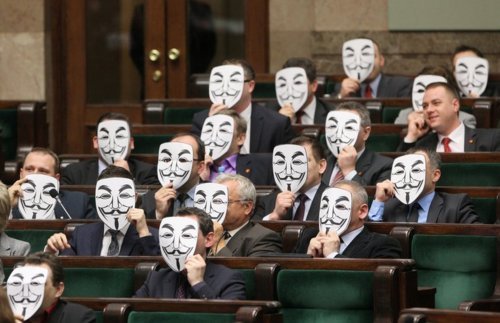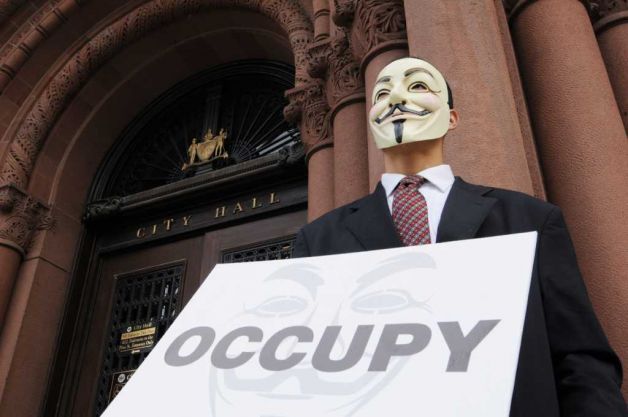Thanks to Luis for helping scribe, and to Molly and Charlie for filling in for our instructors!

We kick off today’s class by watching We Are Legion, a film about the hacktivist collective Anonymous. Sasha and Becky are at a conference, so today’s class is being led by our classmate Molly, and Charlie DeTar. Molly adds a disclaimer: the film is a fan letter, not a documentary. There are different tactics for civil disobedience: Denial of Service (Dos/DDoS) attacks, information dispersal, more participatory actions (e.g. Habbo Hotel). We start by delving into the readings and discussing our thoughts about the forms that civil disobedience may take online.
Loki notes that, despite the way in which Anonymous has been antagonized, they have done little real harm. Compare this with Gandhi, whose Salt March led to the death of over 200 people.
There are certainly parallels between Project Chanology’s leak of Tom Cruise’s Scientology video to the leak of the Pentagon Papers.
The evolution of the Anonymous movement led to the building of some sort of ethos on one side—an ethos based on the freedom of speech, including movements against the censorship of the internet—and the continuation of an unstructured movement that has very few framing characteristics.
Molly says the terminology surrounding Anonymous has always been problematic. The most compelling framing she’s seen so far is the idea of Anonymous as a culture—using a methodological judgment framework seems to be the wrong way of analyzing the movement.
During Operation Chanology, Anonymous operatives were approached by old-school hacktivists involved with Operation Clambake, an earlier activist initiative also directed against the Church of Scientology.

Charlie notes that Thoreau’s conception of civil disobedience would be considered libertarian by modern standards. He talks about tax resistance movements—tax evasion is certainly illegal, and activists could be arrested for it. People often try to draw analogies between traditional activist tactics and online tactics; however, as the Low Orbit Ion Cannon shows us, new tools allow a smaller number of individuals to have a disproportionately large effect. We are also seeing disproportionate reactions and punishments being handed out as a result.
Catherine points out that DDoS can cause real destruction. In one example, DDoS was used agains community organizations in Serbia that destroyed 10 years of action of that movement. Ethan Zuckerman has a very interesting paper about how DDoS attacks have been used against independent media and human rights organizations. The way Molly has been dealing with DDoS in her work is to compare how the tactic is being used to disrupt the operations of their objective or if it is getting attention without causing destruction. If the tactic does not cause destruction it is legitimate; for example, www.mastercard.com does not process actual transactions but is still a visible symbol of the organization.
Aviva says there are so many different kinds of activities and motivations that get associated with the Anonymous label. Molly’s ethical framework maintains that, if a given tactic is legitimate, it matters not who is using that tactic. André believes that it is legitimate to commit a crime to prevent a greater crime, but feels that a crime commited in the name of racism or another immoral ideology is not legitimate.
Charlie says that the moral question is really tricky, and asks us to think about previous movements and how they may have grappled with similar questions at the time. For example, if we look at early union strikes, where protesters were brutally beaten. Since then, we’ve developed an almost sacred conception of the picket line. He doesn’t think we’re going to get a lot of ground by trying to identify moral purity—there will never be a clear line that we can draw; it always has to be a discussion.

Catherine finds Anonymous to be abhorrent, and would never consider taking part. She does appreciate that they were able to take down PayPal. She feels that Anonymous does not necessarily have a goal, which is different than the Occupy movement, for example, that arguably has objectives. Moreover, she sees Anonymous’ pursuit of “the lulz” as part of a juvenile guy culture that could backfire. Charlie highlights that there is a lot of focus on the lulz philosophy, which is absent from some of the more “pure” movements like Occupy. Anonymous culture is riddled with racist, sexist, and homophobic language. However, Molly believes that people participate in and drop out of Anonymous activities as they choose; our traditional understanding of organizations does not apply here.
Luis wonders if Anonymous can be successfully spun out into a political movement and make a real difference in, say, Egypt.
Molly recognizes that Anonymous can be really problematic, but highlights that they create an environment of experimentation in disobedience tactics. Those tactics could be really important afterwards in other social and civil movements. The way in which the American legal system is set up means that we are seeing disproportionately severe sentencing for hacktivists—penalties increase exponentionally and you can “max out” really quickly. Molly tells us how a guy distributed a document from AT&T, which they claimed was worth $16,000. This number was used to determine the outcome of the prosecution; later, however, it was shown that the document was available for sale on the AT&T website for a meager $13.
The Critical Art Ensemble was responsible for popularizing the concept of electronic civil disobedience—they assert that the online space should be a space for mainstream political organizing. Molly describes the group as an “ideological grandfather” to many of the groups that we’ve been discussing. It’s interesting to think about what their opinions on Anonymous might be, but none of CAE’s members have produced any official writings on Anonymous activities. Charlie points out that they very explictly say that they’re artists (commenting on a cause), not activists (acting on a cause), which allows them to shrug off FBI harrassment. One of the features of FloodNET was to generate inadvertently humorous error messages such as “Justice Not Found” or “Human Rights Not Found”.
There’s such a massive imbalance in the calculus of sentencing that many people are willing to take plea bargains. Molly tells us about weev, a “freelance troll” who was recently handed a ridiculous sentence for exposing to Gawker an AT&T security flaw that would allow the email addresses of iPad users to be revealed—tantamount to whistleblowing.
